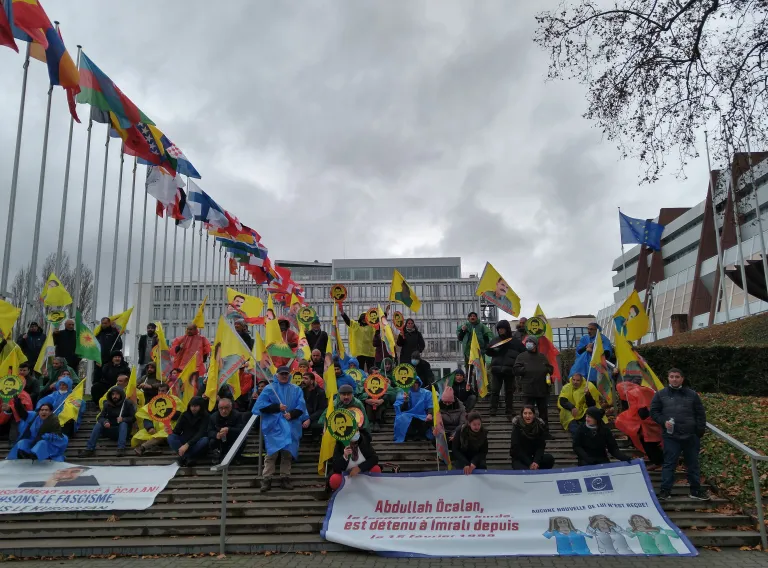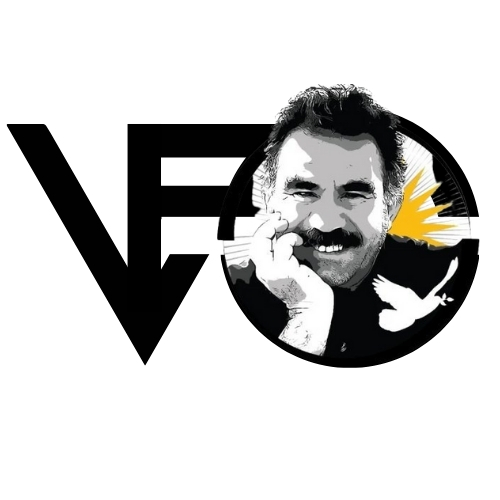Strasbourg, in eastern France, is the home of the Council of Europe, which was founded in 1949 in the aftermath of the Second World War to promote democracy and to protect human rights and the rule of law. It’s 46 member states make it a much broader organisation than the (completely separate) European Union. Turkey is a member of the Council of Europe, and, as is compulsory for all members, has signed up to the European Convention on Human Rights.

Demonstration outside the Council of Europe, December 2021
The European Convention on Human Rights is guaranteed by the European Court of Human Rights (ECtHR). This is a permanent institution whose judges are appointed by the Parliamentary Assembly of the Council of Europe, which is made up members of parliament delegated from the different member states.
Cases can only be heard by the ECtHR once the petitioners have exhausted possibilities for legal redress in their home country. Court procedures can be very drawn out, and, even when the court finds a state guilty of abusing human rights, enforcement of court rulings can be difficult. Any action taken against a state that refuses to comply has to be agreed by the council’s decision-making body, the Council of Ministers. This is made up of the foreign ministers of member states, or their diplomatic representatives (deputies).
The ECtHR has heard more cases against Turkey than against any other member of the Council of Europe, and these have included cases concerning Öcalan’s trial and imprisonment.
Article 3 of the European Convention on Human Rights states that: ‘No one shall be subjected to torture or to inhuman or degrading treatment or punishment’. To assist this, the Council drew up the European Convention for the Prevention of Torture and Inhuman or Degrading Treatment or Punishment, which came into force in 1989 and has also been ratified by all Council members. This convention is supported by the European Committee for the Prevention of Torture and Inhuman or Degrading Treatment or Punishment (CPT). The CPT is made up of independent experts elected by the Council of Europe’s Committee of Ministers. It is not a judicial organisation but works in co-operation with national authorities. It is afforded unique access to places of detention and can carry out ad-hoc visits as well as regular ones. Publication of its findings requires the agreement of the state under inspection – although there is also scope for the CPT to make public statements.
The CPT has made several visits to Imrali island prison where Abdullah Öcalan is held, but most of the changes they have called for have not been implemented. With no-one else being allowed to visit, their visits gain added importance. In the face of concerted pressure they visited Öcalan and the three other prisoners on İmralı in September 2022, but there has been no word of what they found.
The Council of Europe also serves as a forum for debating and monitoring issues around human rights through its assembly of parliamentarians from member states and its congress of representatives from local and regional authorities, and through their associated committees. Members can also host Side Events to bring issues into the Council building, and in June 2022 the Left Group held an event to discuss the illegal regime on İmralı island prison, where Öcalan is held, which heard directly from one of his lawyers.
The Council has drawn up a helpful list distinguishing its organisations from those of the European Union, and also of the United Nations.

Inside the Council of Europe building
To add to the potential for confusion, the European Union also meets in Strasbourg once a month – in a separate but adjacent building – and supportive MEPs also visit the vigil. Turkey is not a member of the EU but is recognised as a candidate state. Turkish relations with the EU are highly politicised. The EU succumbed to Turkish pressure to list the PKK as a ‘terrorist organisation’ in 2002, in the middle of a long unilateral ceasefire by the PKK, when the organisation was emphasising the need for a political solution. This ‘terrorist’ listing is being challenged in the Court of Justice of the European Union, which is based in Luxembourg and is the highest authority on EU law.
(Regardless of Brexit, the United Kingdom is still a member of the Council of Europe and bound by the European Convention on Human Rights, and Russia was also a member until they were expelled following their invasion of Ukraine.)


